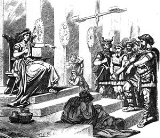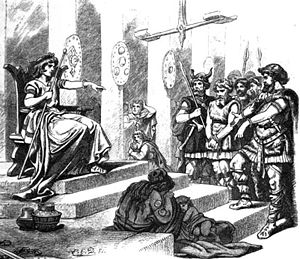
Forseti
Encyclopedia

Æsir
In Old Norse, áss is the term denoting a member of the principal pantheon in Norse paganism. This pantheon includes Odin, Frigg, Thor, Baldr and Tyr. The second pantheon comprises the Vanir...
god of justice
Justice
Justice is a concept of moral rightness based on ethics, rationality, law, natural law, religion, or equity, along with the punishment of the breach of said ethics; justice is the act of being just and/or fair.-Concept of justice:...
and reconciliation in Norse mythology
Norse mythology
Norse mythology, a subset of Germanic mythology, is the overall term for the myths, legends and beliefs about supernatural beings of Norse pagans. It flourished prior to the Christianization of Scandinavia, during the Early Middle Ages, and passed into Nordic folklore, with some aspects surviving...
. He is generally identified with Fosite, a god of the Frisians
Frisians
The Frisians are a Germanic ethnic group native to the coastal parts of the Netherlands and Germany. They are concentrated in the Dutch provinces of Friesland and Groningen and, in Germany, East Frisia and North Frisia, that was a part of Denmark until 1864. They inhabit an area known as Frisia...
. Jacob Grimm
Jacob Grimm
Jacob Ludwig Carl Grimm was a German philologist, jurist and mythologist. He is best known as the discoverer of Grimm's Law, the author of the monumental Deutsches Wörterbuch, the author of Deutsche Mythologie and, more popularly, as one of the Brothers Grimm, as the editor of Grimm's Fairy...
noted that if, as Adam of Bremen
Adam of Bremen
Adam of Bremen was a German medieval chronicler. He lived and worked in the second half of the eleventh century. He is most famous for his chronicle Gesta Hammaburgensis Ecclesiae Pontificum .-Background:Little is known of his life other than hints from his own chronicles...
states, Fosite's sacred island was Heligoland
Heligoland
Heligoland is a small German archipelago in the North Sea.Formerly Danish and British possessions, the islands are located in the Heligoland Bight in the south-eastern corner of the North Sea...
, that would make him an ideal candidate for a deity known to both Frisians and Scandinavians, but that it is surprising he is never mentioned by Saxo Grammaticus
Saxo Grammaticus
Saxo Grammaticus also known as Saxo cognomine Longus was a Danish historian, thought to have been a secular clerk or secretary to Absalon, Archbishop of Lund, foremost advisor to Valdemar I of Denmark. He is the author of the first full history of Denmark.- Life :The Jutland Chronicle gives...
.
Grimm took Forseti, "praeses", to be the older form of the name, first postulating an unattested Old High German
Old High German
The term Old High German refers to the earliest stage of the German language and it conventionally covers the period from around 500 to 1050. Coherent written texts do not appear until the second half of the 8th century, and some treat the period before 750 as 'prehistoric' and date the start of...
equivalent *forasizo (cf. modern German Vorsitzender "one who presides"). but later preferring a derivation from fors, a 'whirling stream' or 'cataract', connected to the spring and the god's veneration by seagoing peoples. However, in other Old Norse words, for example forboð, 'forbidding, ban', the prefix for- has a pejorative sense. So it is more plausible that Fosite is the older name and Forseti a folk etymology.
Norse Forseti
According to Snorri SturlusonSnorri Sturluson
Snorri Sturluson was an Icelandic historian, poet, and politician. He was twice elected lawspeaker at the Icelandic parliament, the Althing...
in the Prose Edda
Prose Edda
The Prose Edda, also known as the Younger Edda, Snorri's Edda or simply Edda, is an Icelandic collection of four sections interspersed with excerpts from earlier skaldic and Eddic poetry containing tales from Nordic mythology...
, Forseti is the son of Baldr and Nanna
Nanna (Norse deity)
In Norse mythology, Nanna Nepsdóttir or simply Nanna is a goddess associated with the god Baldr. Accounts of Nanna vary greatly by source. In the Prose Edda, written in the 13th century by Snorri Sturluson, Nanna is the wife of Baldr and the couple produced a son, the god Forseti. After Baldr's...
. His home is Glitnir
Glitnir
Glitnir is the hall of Forseti, the Norse god of law and justice, and the seat of justice amongst gods and men. It is also noted to have been a place of dwelling for Balder, Forseti's father in Norse and Germanic mythologies...
, its name, meaning "shining," referring to its silver ceiling and golden pillars, which radiated light that could be seen from a great distance. His is the best of courts; all those who come before him leave reconciled. This suggests skill in mediation
Mediation
Mediation, as used in law, is a form of alternative dispute resolution , a way of resolving disputes between two or more parties. A third party, the mediator, assists the parties to negotiate their own settlement...
and is in contrast to his fellow god Týr, who "is not called a reconciler of men." However, as de Vries points out, the only basis for associating Forseti with justice seems to have been his name; there is no corroborating evidence in Norse mythology. 'Puts to sleep all suits' or 'stills all strifes' may have been a late addition to the strophe Snorri cites, from which he derives the information.
The first element in the name Forsetlund (Old Norse
Old Norse
Old Norse is a North Germanic language that was spoken by inhabitants of Scandinavia and inhabitants of their overseas settlements during the Viking Age, until about 1300....
Forsetalundr), a farm in the parish of Onsøy
Onsøy
Onsøy is a peninsula and a former municipality in Østfold county, Norway. The administrative centre was Gressvik.-History:The parish of Onsø was established as a municipality January 1, 1838...
('Odins island'), in eastern Norway, seems to be the genitive case of Forseti, offering evidence he was worshipped there.
Frisian Fosite
According to AlcuinAlcuin
Alcuin of York or Ealhwine, nicknamed Albinus or Flaccus was an English scholar, ecclesiastic, poet and teacher from York, Northumbria. He was born around 735 and became the student of Archbishop Ecgbert at York...
's Life of St. Willebrord
Willibrord
__notoc__Willibrord was a Northumbrian missionary saint, known as the "Apostle to the Frisians" in the modern Netherlands...
, the saint visited an island between Frisia and Denmark that was sacred to Fosite and was called Fositesland after the god worshipped there. There was a sacred spring from which water had to be drawn in silence, it was so holy. Willebrord defiled the spring by baptizing people in it and killing a cow there. Altfrid
Altfrid
Saint Altfrid was a leading figure in Germany in the ninth century. A Benedictine monk, he became Bishop of Hildesheim, and founded Essen Abbey. He was also a close royal adviser to the East Frankish King Louis the German.He is a Roman Catholic saint...
tells the same story of St. Liudger
Ludger
Saint Ludger was a missionary among the Frisians and Saxons, founder of Werden Abbey and first Bishop of Münster in Westphalia....
. Adam of Bremen retells the story and adds that the island was Heiligland, i.e., Heligoland
Heligoland
Heligoland is a small German archipelago in the North Sea.Formerly Danish and British possessions, the islands are located in the Heligoland Bight in the south-eastern corner of the North Sea...
.
There is also a legend of the origins of the Lex Frisionum
Lex Frisionum
Lex Frisionum, the "Law Code of the Frisians", was recorded in Latin during the reign of Charlemagne, after the year 785, when the Frankish conquest of Frisia was completed by the final defeat of the Frisian king Radboud. The law code covered the region of the Frisians...
, the written Frisian law
Legal code
A legal code is a body of law written by a governmental body, such as a U.S. state, a Canadian Province or German Bundesland or a municipality...
. Wishing to assemble written lawcodes for all his subject peoples, Charlemagne
Charlemagne
Charlemagne was King of the Franks from 768 and Emperor of the Romans from 800 to his death in 814. He expanded the Frankish kingdom into an empire that incorporated much of Western and Central Europe. During his reign, he conquered Italy and was crowned by Pope Leo III on 25 December 800...
summoned twelve representatives of the Frisian people, the Āsegas ('law-speakers'), and demanded they recite their people's laws. When they could not do so after several days, he let them choose between death, slavery, or being set adrift in a rudderless boat. They chose the last and prayed for help, whereupon a thirteenth man appeared, with a golden axe on his shoulder. He steered the boat to land with the axe, then threw it ashore; a spring appeared where it landed. He taught them laws and then disappeared. The stranger and the spring are identified with Fosite and the sacred spring of Fositesland.
Fosite has been suggested to be a loan of Greek Poseidon
Poseidon
Poseidon was the god of the sea, and, as "Earth-Shaker," of the earthquakes in Greek mythology. The name of the sea-god Nethuns in Etruscan was adopted in Latin for Neptune in Roman mythology: both were sea gods analogous to Poseidon...
into pre-Proto-Germanic, perhaps via Greeks purchasing amber
Amber
Amber is fossilized tree resin , which has been appreciated for its color and natural beauty since Neolithic times. Amber is used as an ingredient in perfumes, as a healing agent in folk medicine, and as jewelry. There are five classes of amber, defined on the basis of their chemical constituents...
(Pytheas
Pytheas
Pytheas of Massalia or Massilia , was a Greek geographer and explorer from the Greek colony, Massalia . He made a voyage of exploration to northwestern Europe at about 325 BC. He travelled around and visited a considerable part of Great Britain...
is known to have visited the area of Heligoland in search of amber).
In popular culture
Forseti appears in the Dungeons & DragonsDungeons & Dragons
Dungeons & Dragons is a fantasy role-playing game originally designed by Gary Gygax and Dave Arneson, and first published in 1974 by Tactical Studies Rules, Inc. . The game has been published by Wizards of the Coast since 1997...
role-playing game
Role-playing game
A role-playing game is a game in which players assume the roles of characters in a fictional setting. Players take responsibility for acting out these roles within a narrative, either through literal acting, or through a process of structured decision-making or character development...
's pantheon, and is often chosen as a patron god by paladin
Paladin (Dungeons & Dragons)
The paladin is one of the standard playable character classes in most editions of the Dungeons & Dragons fantasy role-playing game. The paladin is a holy knight, crusading in the name of good and order, and is a divine spellcaster...
s.
In the games Fire Emblem: Seisen no Keifu and Fire Emblem: Thracia 776
Fire Emblem: Thracia 776
is a Japanese tactical role-playing game developed by Intelligent Systems and published by Nintendo, and the fifth installment in the Fire Emblem series. It is also the third and final Fire Emblem series title to be released on the Super Famicom. It was originally released through Nintendo Power...
, there is a dragon called Holsety (Forseti), who is worshipped as a deity.

